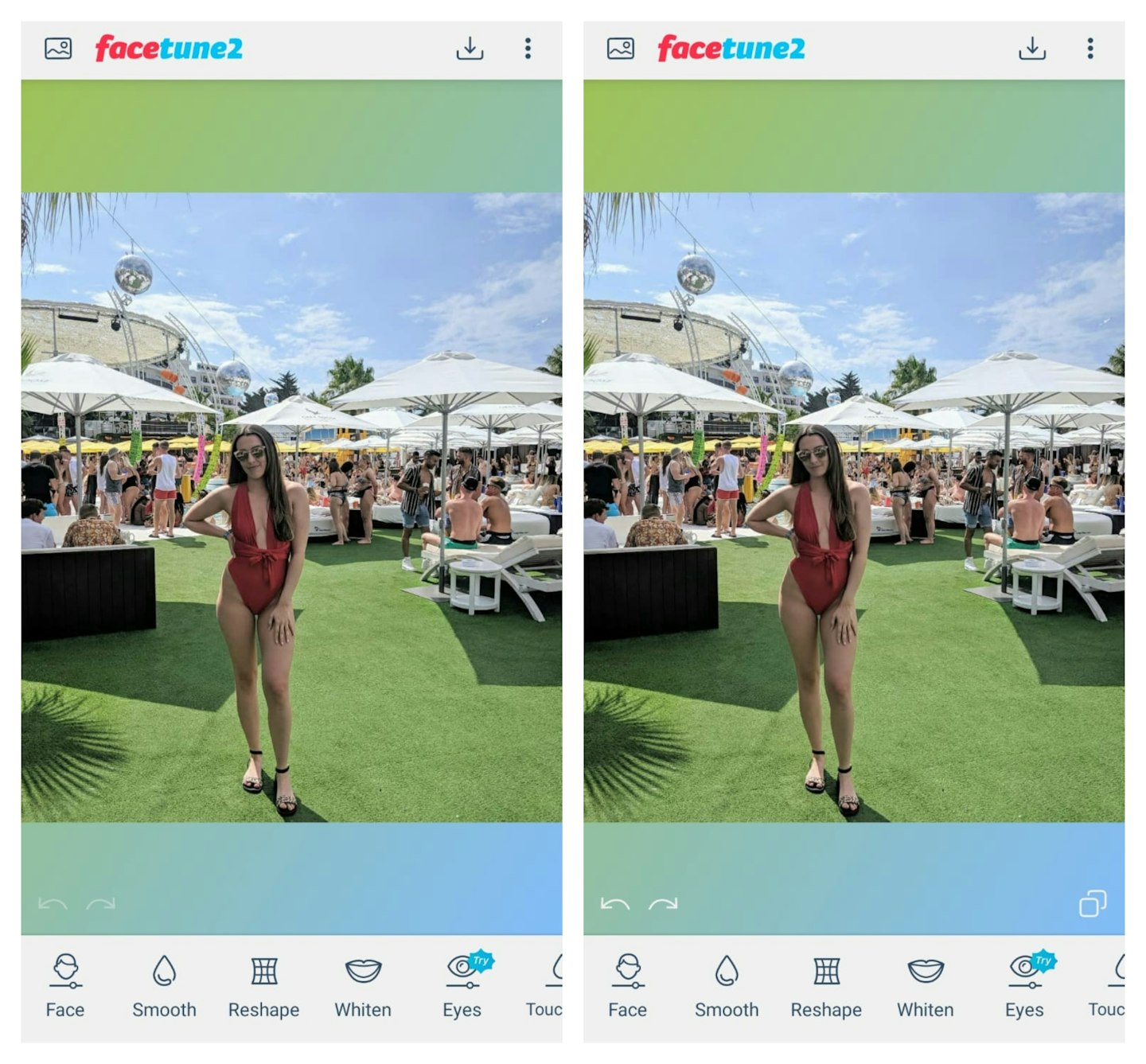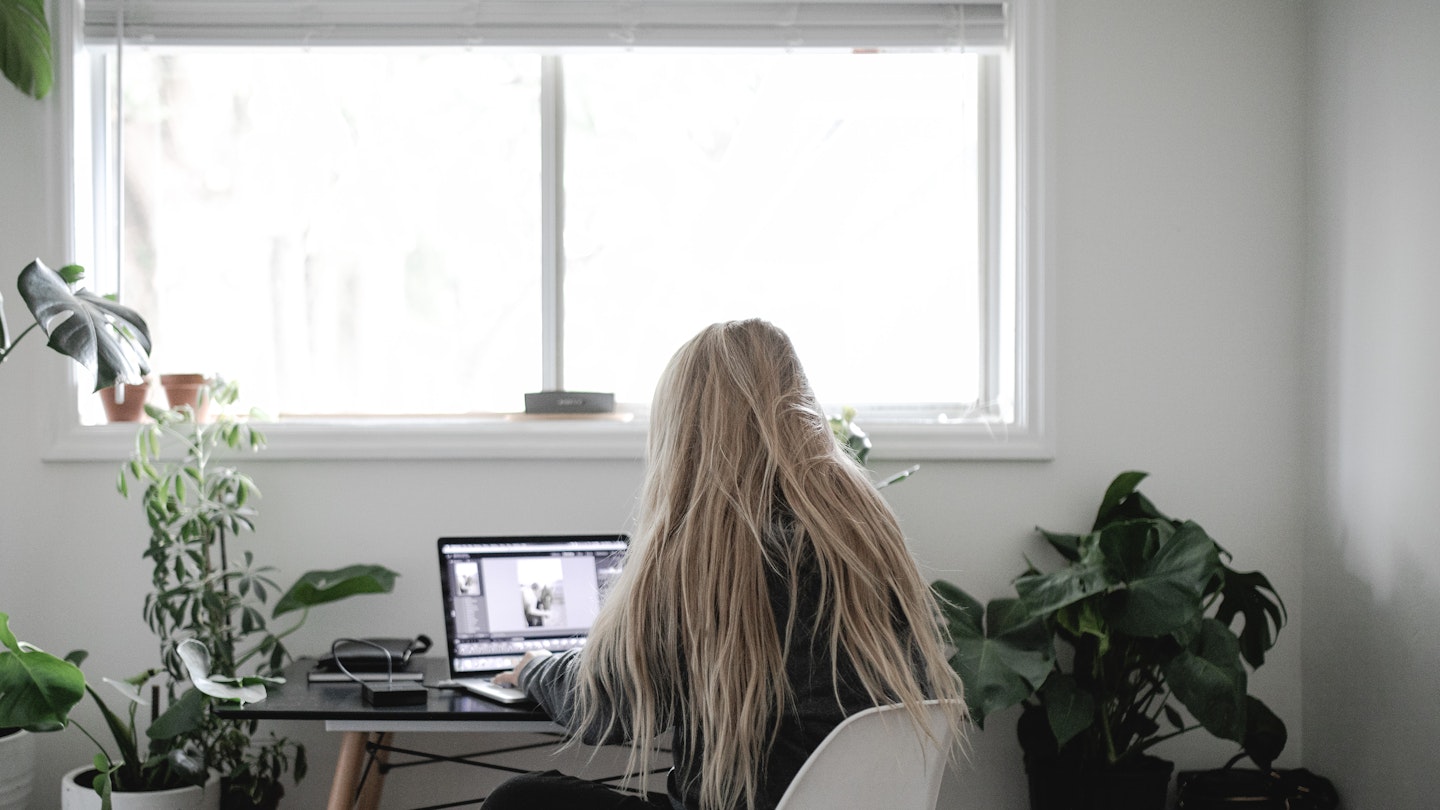A new study has revealed that only 29% of people would post a picture of themselves on social media without editing it first. This bleak research showed that people mostly edit their skin, face shape and arms, with lips, bums and legs surprisingly low on the list.
The study, commissioned by phone case retailer Case24, also found that London in particular is the capital of photoshop, with 81% of people refusing to post a picture without touching it up. While most stick to Instagram’s editing tools, 71% of people use Facetune, the editing app that makes reshaping your body terrifyingly easy.
I remember the first time I downloaded Facetune. I wanted to whiten the wall I was sitting on in an otherwise incredibly beautiful – or should I say, Instagrammable – picture of the Santorini sunset. I had messaged a friend asking her how do it, and she suggested the app, explaining how I could cover the grubbiness on the wall by colouring it in.
I began editing, and almost as if my brain could see the future, I instantly felt I should stop. It was more effort than I’d ever put into editing a picture for Instagram, I was previously only accustomed to the odd filter. ‘Why do I care this much about the wall being white?’ I asked myself, before closing the app and posting the picture as it was with a slight crop.
It would be a year before I re-opened Facetune out of boredom, editing a picture of me in a bikini, testing how much I could reshape my body before the alterations were noticeable. References to celebrities and influencers using the app had exploded in the year I’d let the tool sit idly in my background apps, and now I was curious how far you could take it before the pixilation, blurring or background lines would give away the edits.
It was meant to be fun, an experiment of sorts to teach myself how easy it is for people to change their bodies, faces or backgrounds and post it to Instagram as if that’s just how they look every day. But the easiness of it, despite registering as acutely concerning, was addictive.
For those of you who haven’t downloaded it yet – and I wouldn’t recommend – let me explain. Facetune isn’t the app you use to brighten a background or give your complexion a glow with a good filter, it’s the app you use to alter you. The first option on the app is ‘Face’, where you can increase or decrease the size of your jaw, smile, eyes, lips, nose and eyebrows. Sliding a scale up and down, even the most extreme changes are realistic, that’s why the app is so technically good, and so emotionally awful.
I would open the app and give myself virtual cosmetic surgery.
I made a promise to myself to never post a picture to social media where I had edited my body, that felt like a step too far. But that didn’t stop me doing it. Whenever I was bored of my usual socials, I would open the app and give myself virtual cosmetic surgery. Jawline reconstruction, a tummy tuck, a Brazilian butt lift, a nose job and of course, lip filler.
The entire process took approximately five minutes, if that. But that’s not the most terrifying part. It’s that I still looked like me, just better. Or rather than ‘better’, the me that would most ascend to the top of society's beauty standards. And I felt absolutely awful.

Because ultimately, that’s not me. All I was telling myself by looking at that version of myself was that the real me isn’t good enough. Even just opening the app, that’s what we tell ourselves, isn’t it? Whether you go into the editing tools or not, whether you stare at that picture of yourself with the ‘perfect figure’, even just contemplating changing your appearance with photoshop is you telling yourself you’re wrong, you’re less valuable, you’re less worthy just as you are.
When we tell ourselves that, it affects everything. How can you move through the world confidently, in every aspect of life from work to socialising, if we can’t take a picture of ourselves without instinctively thinking how we would edit it? If our minds are that prone to assuming we’re not good enough as we are, it’s bound to impact how we present ourselves in other parts of our life.
How can we have healthy relationships with other people – romantically or otherwise – if we rely so much on someone else’s approval that we alter our appearance for it and build online profiles with false versions of ourselves? How can we truly be happy every day, if we don’t love ourselves enough to be happy with our natural self?
I was subconsciously undoing years of self-care purely because I was bored.
That’s why I stopped using the app, because I was subconsciously undoing years of self-care purely because I was bored and got a bit curious. See, I’m lucky enough that I have done the work to love myself as I am. I spent years reciting positive affirmations to counteract the voice in my head that made me stare at all my flaws whenever I looked in the mirror. If I saw an advert with yet another woman dubbed the picture of ‘true beauty’, I would remind myself how bad it is to let that advertising warp my image of myself.
And yet, I still became obsessed with Facetune. What if I hadn’t done that work? Most likely, I’d be one of those above statistics. I’d be one of the countless people posting altered versions of themselves to Instagram, only to then be validated by that choice by the inevitable increase in likes. Perhaps even, I’d have tried to make my virtual surgery a reality. Taking those pictures of the apparently elevated me to a surgeon or aesthetician, as so many do nowadays.
Having experienced this acutely modern version of self-loathing, hearing that the vast majority of us now wouldn’t post a picture without editing it first is terrifying. We can sit and hope that most of those people are only adding the odd filter or brightening the sky, but with 71% of people using Facetune, chances are they’re doing exactly what I was.
And it needs to stop, not just for ourselves, but for the countless other women seeing us online wondering why their body isn’t that perfectly proportioned, why their skin isn’t that smooth, why their face isn’t that model-esque. They might suspect it’s not real, but they won’t know for sure. We owe it to ourselves and the women we love to admit that it’s not - and stop.
Read More:
What Happened When A Group Of Teenagers Were Asked To Alter Their Portraits For Social Media
Using Instagram and Snapchat Filters Made Me Hate My Actual Face
There’s An Ugly Side To Filters On Instagram And This Make-Up Artist Is Calling Them Out
